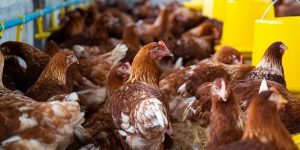
Ethiopia, a nation endowed with vast agricultural potential, faces significant challenges in achieving food security. These challenges stem from a variety of underlying issues, including climate change and economic constraints. Recognizing the urgency of these issues, the government has launched the “Bounty of the Basket” (Yelemat Tirufat) program—an innovative initiative aimed at enhancing food production and promoting sustainable agricultural practices across the nation. This program seeks not only to address food shortages but also to empower local communities through entrepreneurship and agricultural innovation.
As the Yelemat Tirufat initiative gains traction, it has attracted numerous citizens and entrepreneurs eager to contribute to its goals. Recently, a group of journalists had the opportunity to visit Sheger City, particularly focusing on the Gelan Guddaa and Koye-Feche Sub-Cities. During this visit, they witnessed firsthand how local farmers are engaging in various agricultural practices, including dairy farming, poultry production, honey processing, animal fattening, and aquaculture. These activities highlight the diverse opportunities within the agricultural sector that the Yelemat Tirufat program aims to support.
One notable entrepreneur is Muslim Nasir, CEO of FeedWell PLC, who, alongside his partner Abenezer Engda, is making significant strides in the Gelan Guddaa Sub-City. Muslim shared his journey into the agricultural sector and the vital support he has received along the way. “I had been self-employed for five years, but my ventures faced numerous challenges,” he explained. However, alongside his partners—whom he studied in China, where he earned a Bachelor of Science in Mechanical Engineering—he has now embarked on a successful journey in agro-processing. Abenezer, who graduated with a degree in Economics and International Trade, has also played a crucial role in their entrepreneurial pursuits.
Upon returning to Ethiopia in 2020, the duo explored various business avenues while honing their entrepreneurial skills. “We always dreamed of entering the agro-processing industry, and we realized we possessed the necessary resources, potential, and market to succeed,” Muslim stated. Together, they established FeedWell PLC, laying out a clear roadmap for their goals. Their initial steps included drafting a comprehensive business plan, identifying reliable machinery manufacturers, and creating a project budget. After approaching financiers, particularly the Development Bank of Ethiopia, they faced a nearly two-year process to finalize their financing.
The establishment of a sustainable and scalable working environment was also a priority for the FeedWell team. They engaged with the Oromia state and the administrators of Sheger City and Gelan Guddaa Sub-City, who facilitated access to essential working space and infrastructure. With their plans organized, they developed strategies for both backward and forward supply chain linkages, aligning their efforts with the Prime Minister’s vision for the “Bounty of the Basket” initiative. Their business aims to operate a poultry farm that specializes in raising starter chickens, accompanied by market linkages established through innovative “portable fast food mini shops” that aim to provide affordable, quality, and sustainable chicken products to local consumers.
Quality animal feed is indispensable for maintaining livestock health and maximizing productivity. Recognizing this, FeedWell PLC is committed to prioritizing high-quality nutrition for farmers. By doing so they can enhance livestock welfare, improve growth rates, and boost overall profitability. Muslim has also initiated plans to establish an animal feed production facility, contacting the Ethiopian Development Bank for support. “They conducted a thorough examination of my project and provided me with machinery worth 12 million birr through lease financing,” he confirmed, reflecting on the support that has significantly contributed to their ambitions.
The significance of the “Bounty of the Basket” initiative cannot be overstated. Its focus on agricultural productivity, community engagement, and sustainable practices holds the potential to enhance food security across the nation. When all stakeholders—government, private sector, and civil society—actively contribute this initiative could bring transformative changes to Ethiopia’s agricultural landscape, ensuring a brighter future for generations to come. The FeedWell team sources inputs from various regions and supplies high-quality animal feed to enterprises engaged in poultry, fattening, and dairy production. Additionally, they have established reliable water and electricity supplies, with strong support from the local administration.
As a testament to their success, FeedWell PLC has already created job opportunities for over five local citizens and aims to expand further. The company is dedicated to providing high-quality feed critical for livestock farming and, consequently, food security.
Sintayehu Sisay (PhD), Head of Gelan Guddaa Sub-City Agriculture Office, stated, “We are tirelessly working to empower communities by providing financial support and training in sustainable practices. By equipping individuals with the necessary skills and resources, the program nurtures entrepreneurship and self-sufficiency.”

For this fiscal year, the initiative has set ambitious goals, including the organization of 500 new enterprises, with 300 already established. Among these are 21 active poultry farms and 22 dairy fattening operations operating from a single site, along with two animal feed production ventures. The local government encourages these initiatives, understanding that access to quality animal feed is essential for raising healthy livestock, which in turn produces vital meat, milk, eggs, and other nutritional products for the community.
The relentless push for development within the agricultural sector under the Yelemat Tirufat initiative reflects a deeper understanding of the role that quality feed plays in enhancing livestock health and productivity. By promoting access to high-quality nutrition, the FeedWell team is not just benefiting livestock; they are also supporting the establishment of sustainable and efficient agricultural systems throughout the region. They aim to ensure the productivity of the agro-processing sector, recognizing that high-quality feed promotes efficient growth, successful reproduction, and overall animal health—concepts crucial for improving farmers’ livelihoods and contributing to both local and national economies.
Sintayehu emphasized the importance of effective engagement of human capital in national development. This approach not only facilitates economic growth but also empowers various sectors, particularly agriculture. By focusing on productive practices, especially in areas like poultry farming, honey production, animal fattening, and dairy farming, stakeholders can cultivate a sustainable agricultural ecosystem that benefits both farmers and the broader economy.
He further highlighted that, engaging human capital productively through the Yelemat Tirufat initiative showcases a genuine potential to transform agricultural practices and drive national development. Empowering farmers to actively participate in critical agricultural sectors—such as poultry, honey production, animal fattening, and dairy farming—can lead to the creation of a resilient agricultural landscape. Such developments are essential for ensuring food security, fostering economic stability, and contributing to the overall prosperity of the nation.
Through education, access to resources, community support, and market engagement, Ethiopia can unlock the full potential of its agricultural sector. The ripple effects of these efforts will undoubtedly benefit not only farmers and their families but also the society at large. As Yelemat Tirufat program gathers momentum, it stands as a beacon of hope for a nation seeking to leverage its agricultural wealth towards achieving food security and sustainable development for generations to come.
BY MENGISTEAB TESHOME
THE ETHIOPIAN HERALD TUESDAY 15 OCTOBER 2024





